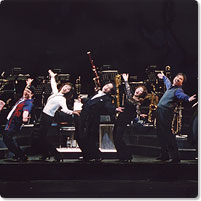Parco Produced
The Orchestra Pit 2003
Photo by Masahiko Yako
Data
:
First Performance: 2000
Performance time: Approx. 3hr. 30min.
Cast: 13 (9 men, 4 women)
Koki Mitani
Ochepi!: The Orchestra Pit

Koki Mitani
Playwright and director. Born in Tokyo in 1961, Koki Mitani graduated from the theater course of the Department of Arts of Nihon University. While in university, in 1983 he got together with fellow students to form the company “Tokyo Sunshine Boys.” With a strong focus on comedy, he has written many well-made plays with clearly depicted characters. In addition to theater, he has written the numerous screenplays for the television, and a good number of his representative works have been made into movies, such as Twelve Gentle Japanese (premiered 1990), taking its situation from the coming introduction of a jury court system in Japan; Warai no Daigaku (University of Laughs) (premiered 1996), a play about the cat-and-mouse game played between a light theater playwright and the censors during World War II (adapted in English translation by Richard Harris as The Last Laugh and performed in the UK and Japan in 2007); the human drama Ryoma no Tsuma to sono Otto to Aijin (Ryoma’s Wife, Her Husband and His Mistress) (Premiered 2000), about the life of the widow of the late Edo period hero Sakamoto Ryoma. Mitani made his debut as a film director in 1997 with Radio no Jikan (premiered 1993), a comedy he wrote in his theater company days about the slapstick goings-on during the recording of a radio drama, since then he has continued his activities as a film director as well. His theater company Tokyo Sunshine Boys has suspended their activities for 30 years as Mitani announced after their 1997 production Tokyo Sunshine Boys no Wana . His awards include the 4th Yomiuri Theater Grand Prix “Best Play” award for Warai no Daigaku , the 3rd Tsuruya Namboku Drama Award for Matoryoshika (1999), the 45th Kishida Drama Award for his first musical Okepi! (2000) and the Akimoto Matsuo Award of the 7th Asahi Performing Arts Awards of 2008, among others.

When the curtain opens, the stage is in the form of an orchestra pit. An additional twist of interest is involved through the fact that the music performance for the musical supposedly being performed on that upper stage also becomes numbers for the play that is occurring in the orchestra pit in front of us.
The first to appear on stage is the conductor, who will also serve the role of narrator connecting the audience to the stage. The conductor introduces the musicians (actors) as they gather in twos and threes on the stage, and as he does so he explains to us that here below the glamorous world of and evening’s theater being acted out on the stage above unseen musicians of the band give there all in each night’s performance and live their lives to the full. All the events of life happen down here in the orchestra pit, too, he explains.
The conductor’s wife is the violinist Hachiko. She has left home to live with her lover, the trumpet player Todo. While trying to think of some way to get his wife back, the conductor also harbors a wish to become involved with the harpist, Shinonome.
However, the guitarist Tange announces that he and Shinonome have become engaged. Seeing the perplexed expression on Shiononome’s face, the conductor asks her if it is true, only to hear her confess that Tange has been pushing things ahead even though she has no intention of getting married.
When the conductor decides that the time has come to tell Tange the truth and convince him to abandon his dream, he learns that in fact it is Shinonome’s indecisive character and her habit of leading any man on that causes her to give them the impression that she likes them even though she doesn’t. Not only had she recently gone with Tange to the same restaurant that she had been to with the conductor, but she had also met his parents and gone on a trip to a hot spring spa. Still, she explains that she only went along because it was a spa that she had always wanted to visit.
Apart from these tangled love relationships, the musical is proceeding up on the stage and the conductor must busy himself with the preparations and performance of each number even though there are more troubles he has to deal with at the same time. There is the pianist who is always getting her part wrong, the trumpet player with a hangover, the drummer who is trying to sell detergent from a disreputable pyramid type sales scheme, the violist who is always nodding off and the high-strung oboist with a difficult personality. It is all the conductor can do just to keep the show going.
Along the way, it is revealed that Hachiko has left Todo because he was cheating on her and the object of his infidelity is none other than Shinonome.
Shinonome lets her feelings come out in a song, saying her loneliness makes her want to be loved by someone even though her fear of being hurt keeps her from loving anyone back.
The conductor tries to convince Hachiko that they should try to make a new start together, but she tells him that when two people are together for a long time they begin to see only each others’ bad sides. She tells him that she left him because she didn’t want to come to dislike him any more. She says she respects him because “Only you could hold this band of musicians together and make it function.”
Up on the stage above the musical is coming to a climax and the curtain closes as the orchestra is playing the ending piece.
Related Tags

